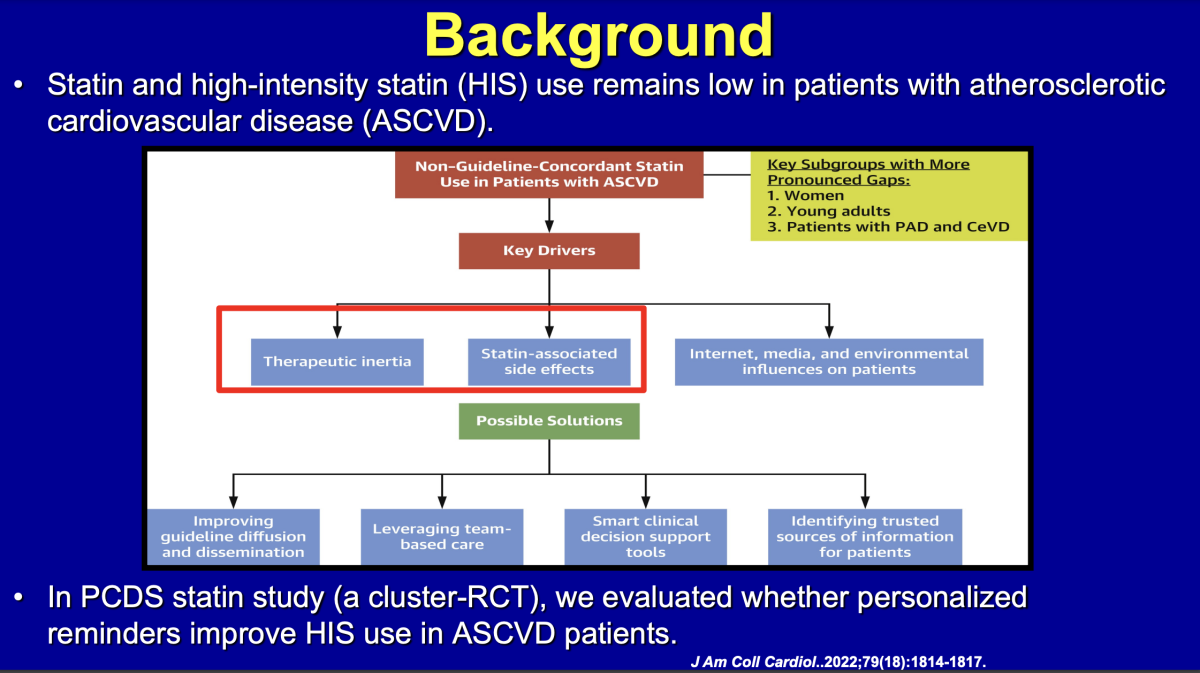
March 5, 2023 — Patients with cardiovascular disease, such as heart disease, stroke or peripheral arterial disease, were significantly more likely to be prescribed guideline-recommended high-intensity statin therapy if their clinician was sent an automated reminder with information about their cardiovascular disease history, prior statin use and history of statin associated side effects, according to research being presented at the American College of Cardiology’s Annual Scientific Session Together With the World Congress of Cardiology. The reminders were generated using machine learning algorithms alongside guideline recommendations.
Statins are cholesterol-lowering medications that are highly effective at preventing premature death in people with established cardiovascular disease related to clogged arteries, such as a previous heart attack, as well as reducing the likelihood of serious cardiac events in people at high risk for heart disease or stroke. Although medical guidelines recommend high-intensity statins for nearly all people with established cardiovascular disease, previous studies have shown that rates of guideline compliance are low.

“We found that if you’re able to send reminders that have information that is personally relevant to the patient, it works,” said Salim Virani, MD, PhD, staff cardiologist at the Michael E. DeBakey VA Medical Center in Houston, vice provost for research and professor at the Aga Khan University in Karachi, Pakistan, and staff at The Texas Heart Institute/Baylor College of Medicine. “Our data also show that it is important to be mindful of how reminders fit in with the clinical workflow to avoid creating alert fatigue.”
To develop the reminder system, researchers first used machine learning algorithms to parse clinician notes for evidence of statin-associated side effects (a factor often cited as contributing to low guideline compliance) and generate summaries of patients’ cardiovascular disease history, history of statin use and any reported side effects. They then conducted interviews with patients and clinicians to understand the contexts in which reminders presenting patient-specific summaries alongside general statin guidelines would be most useful.
To test the reminder system, researchers randomly assigned 14 clinics (with a total of 117 clinicians treating 18,427 patients) to implement reminders for a 15-month period and 13 clinics (128 clinicians treating 18,214 patients) to continue their usual care practices. All clinics received basic education on statin guidelines before the study began, and all clinicians had access to a dashboard with detailed information on statin therapy use in their patients with cardiovascular disease throughout the study.
For clinics implementing the reminders, about 27% of the reminders were sent synchronously, meaning they were sent within two to seven days before the clinician saw the patient, and the rest were sent asynchronously at other times during the study. The system was designed to not send reminders to clinicians who had more than three unsigned reminders in a row.
Overall, the study, which is among the largest to date to use machine learning-generated reminders to influence clinicians’ prescribing practices, involved over 36,000 patients with over 18,000 in each arm. In the intervention arm, 4,928 reminders were sent in total on 4,532 unique patients. This was only about half of the cohort that was eligible for reminders due to the protocols built into the study algorithm to minimize alert fatigue. The proportion of patients prescribed high-intensity statin therapy increased by 3.8% across all clinics in the intervention arm compared with the usual care arm, and that proportion increased by 10.1% among the subset of patients who were featured a reminder in the intervention arm.
“A 10% increase in high-intensity statin use is very meaningful at a health care system level given the challenges associated with this issue as shown in several studies,” Virani said. “Our results show that for every 10 reminders sent, health care systems can expect one patient with cardiovascular disease to be initiated or titrated to high-intensity statin therapy.”
Patients featured in synchronous reminders were slightly more likely to be prescribed high-intensity statin therapy, as were patients who had not previously reported a statin-associated side effect. However, the study showed a 9% increase in high-intensity statin use even in patients with statin associated side effects, among the subset of patients who were featured in a reminder in the intervention arm. “This is important as these patients are the toughest to treat given their prior history of statin associated side effects,” Virani said.
In addition, statin adherence (as measured by data on prescription refills) was 2.8% higher among patients in the intervention group. The total proportion of patients prescribed any statins (not only high-intensity statin therapy) declined slightly in both groups, but this attrition was lower among patients in the intervention group.
Despite the benefits seen from the alerts, Virani said roughly 30% of the clinicians in the study opted out of the trial, underscoring the continuing challenge of creating alerts that can attract clinicians’ attention without overwhelming them. He said that the study was conducted at a time when workflows were changing rapidly due to iterative waves of COVID-19, which may have affected the results. The researchers plan to further analyze the data to understand why some clinicians opted out of the reminders. In addition, clinicians were not able to click directly from the reminder to initiate a prescription, which may have limited its use as a clinical decision support tool.
The study was funded by Department of Veterans Affairs Health Services Research & Development.
This study was simultaneously published online in the journal Circulation at the time of presentation.
For more information: www.acc.org


 July 31, 2024
July 31, 2024 









